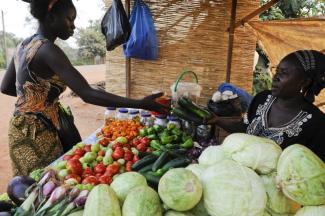Editorial
Rural urbanisation

Even in remote German villages, there is employment in different trades and professions, though the variety is of course smaller than in the cities. The roads are good. There are schools, hospitals and supermarkets, and the power grid does not let people down. In regard to educational opportunities, professional options, health care, leisure activities and personal choices in general rural life in many advanced nations has actually become quite urban.
Matters are completely different in the rural areas of developing countries, where poverty and the lack of opportunities haunt masses of people. At first glance, their needs are not as obvious as the misery of slum dwellers in the cities, but rural poverty is even more common and often more desperate.
All too often, the state itself is absent from rural areas, as is evident in the lack of roads, electric power or facilities for health care and education. In such an underdeveloped environment, no trades can prosper and no businesses grow, and only agriculture provides livelihoods.
Accordingly, farms are extremely important and get most of the attention. Promoting them is essential for rural development. The challenges are huge, however, and require donor support, at least initially, as experts argue. Building and developing infrastructure is indispensable. Roads, water supply and other hard infrastructure matter, and so do schools, health centres and access to public administrations in general. Extension services must make regionally specific advice available and inform peasants about farming methods, seed, irrigation, fertiliser et cetera. Nowadays, the impacts of climate change must obviously be taken into account too.
The best kind of rural development would be the emergence of many small towns as nodes linking the villages. If farmers thrived, new markets would emerge to supply them with the inputs they need. Moreover, their products could be processed at the town level, adding even more opportunities for income generation and employment.
For many reasons, lots of small towns are preferable to megacity growth. Small towns are more attractive in environmental, social and economic terms. They are thus more sustainable than huge agglomerations, which mostly are overburdened anyway. Ultimately, rural life in developing regions might become urbanised in a similar way as it is in Germany today.
Such a development could serve democratisation too. As stated above, there is an utter lack of state institutions and services in rural areas. Elected governments really do not have much of a role to play, and traditions and clan elders set the rules accordingly. Democratic modernisation depends on infrastructure and leads to better infrastructure. Roads, water mains, schools and hospitals are the kind of proof of effective governance that allows people to have faith in their state, which in turn fosters its legitimacy. The more people identify with the state, the system of government and democracy, the less their lives will be determined by tradition alone, and the more they will be able to take their fate into their own hands.
Sabine Balk is a member of the editorial team of D+C/E+Z.
euz.editor@fs-medien.de














